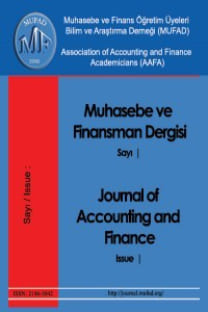Türkiye’de Muhasebeci Eğitiminin Gelişim Süreci: IFAC Standartları ile Mukayeseli Bir İnceleme
Muhasebecilik, tüm toplumların hayatında önemli rolü olan bir meslektir. Dünya çapında gerçekleşen piyasa ekonomisine geçiş, yatırımların artması ve faaliyetlerin daha büyük boyutlara ulaşarak ulusal sınırları aşması nedeniyle artık muhasebecilerin geniş ufuklu, küresel bir dünya görüşüne sahip olmaları gerekmektedir. Hızlı değişim, muhasebecilerin faaliyet gösterdiği çevrenin temel özelliği haline gelmiştir. Değişim küreselleşme, bilgi ve iletişim teknolojileri, düzenleyicileri ve gözetim kurullarını da içeren çıkar gruplarının genişlemesi gibi gelişmelerdenkaynaklanmaktadır. Günümüzde muhasebecilerin sadece kredi kuruluşlarının ve yatırımcıların değil, aynı zamanda diğer çıkar gruplarının da finansal ve finansal olmayan bilgi ihtiyaçlarına cevap vermeleri beklenmektedir. Muhasebecilerin sürekli değişime ayak uydurabilmesi, önemli ölçüde mesleki bilgi, mesleki beceri ve mesleki değerler, etik ve niteliklere bağlıdır. Bu nedenle, muhasebeci olmak isteyenlerin yenilikleri öğrenme ve uygulama konusunda sürekli istekli olması gerekir. Bu çalışmada, ülkemizde muhasebecilerin mesleki eğitimine yönelik yasal düzenlemeler tarihsel gelişim açısından incelenmekte ve söz konusu yasal düzenlemeler güncel haliyle ülkemizin de üyesi olduğu Uluslararası Muhasebeciler Federasyonu’nun yayımladığı Uluslararası Muhasebeci Eğitimi Standartları ile mukayese edilmektedir. Böylece ülkemizdeki düzenlemelerin ve uygulamaların IFAC standartlarına uyum düzeyi tespit edilmeye çalışılmaktadır.
Anahtar Kelimeler:
Türkiye’de muhasebeci eğitimi, IFAC muhasebeci eğitimi standartları.
(The Development Process of Accountants Education in Turkey: A Comparative Analysis with the IFAC Standards
(The Development Process of Accountants Education in Turkey: A Comparative Analysis with the IFAC Standards) Accountancy is a profession that plays an important role in all societies. As the world moves toward global market economies, and with investments and operations crossing borders to an ever greater extent, professional accountants need a broad global outlook to understand the context in which businesses and other organizations operate. Rapid changes have been the main characteristic of the environment in which professional accountants work. Pressures for change are coming from many sources including globalization, information and communicationtechnologies, and the expansion of stakeholder groups, including regulators and oversight boards. Professional accountants are now expected to serve the needs not only of investors and creditors but also the information needs of many other users of financial and nonfinancial information. To enable adaptation to constant change depends on a set of professional knowledge, professional skills, and professional values, ethics and attitudes broad enough. Therefore individuals who become professional accountants should have a constant desire to learn and apply what is new.This study aims to investigate the current regulations on education of professional accountants from perspective of historical development process and compare them to general framework of International Education Standards for Professional Accountants issued by The International Federation of Accountants (IFAC) in order to reveal to what extent the said regulations and applications are in accordance with IFAC standards.
- ISSN: 2146-3042
- Yayın Aralığı: Yılda 4 Sayı
- Başlangıç: 2005
- Yayıncı: Muhasebe ve Finansman Öğretim Üyeleri Derneği (MUFAD)
Sayıdaki Diğer Makaleler
Türkiye’de Muhasebeci Eğitiminin Gelişim Süreci: IFAC Standartları ile Mukayeseli Bir İnceleme
Mehmet Özbirecikli, Arın Pastacıgil
Ender BOYAR, Ali Haydar GÜNGÖRMÜŞ
1929 ve 2008 Krizlerinin Karşılaştırılması: Dünya ve Türkiye Örneği
Cengiz Toraman, H. Aydın Okuyan
Lojistik Faaliyetlerin Rekabet Stratejileri ve İşletme Kârı İle Olan İlişkisi
Osmanlı’da Vakıf Muhasebesi ve Lala Sinan Paşa Vakfı Muhasebe Örneği
Bağımsız Denetimin Anonim Ortaklıklarda Kurumsal Yönetimin Gelişmesine Etkisi
KOSGEB Hizmet ve Destekleri: KOBİ’ler Ne Ölçüde Faydalanmakta?
